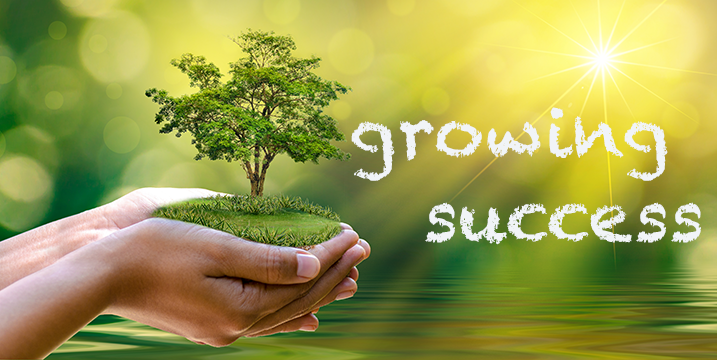Growing Success - Should You Start (or re-start) Growing?
by Sid Raisch
The historical supply chain shortage of 2020 and 2021 has made the work of acquiring plants from growers more difficult than any time in the past that I can recall. Yes, it was difficult, and a lot of extra work compared to years past, but you survived what is likely an anomaly of a historic and catastrophic, but episodic event. The dust will clear and our vision will clear again. The question is, will it ever be that difficult again? More importantly, will you do yourself more harm than good if you start the also very difficult process of growing?
A favorite and universal definition of Success is whatever we define it to be for ourselves, should we decide to define it. It is always better and more likely that we’ll achieve the success we ourselves define. Celebrating success is encouraging to ourselves and others and an important part of belonging to groups, whether they be our family group, a company, or The Garden Center Group. It is even more important to understand the success we’re celebrating.
Wasn’t it great to see so many Group Clients on stage this year in the 2020 P&L Study “Best of the Best” Group? It was especially good to see that so many of them are retail growers, who have always strived to be successful in proportion to the amount of work they do growing and the risk they carry in their business in addition to the risk and work of retailing. It was a hard-earned award for all of them, and it may be part of leading others to consider growing themselves. Contrast this with the fact that there has never before been a Best of the Best Award Group, and that Retail Growers have rarely been among those in the Best Practices Group.
Danger, Danger Will Robinson!
If we were to take a poll of retail growers I’m not sure how many would say it is more difficult to grow than it is to retail, or more difficult to retail than to grow. Could it possibly be easier to do both, compared to doing only one or the other? We have to wonder about that, don’t we? In retail, listening to and responding to the consumer wins half the battle. If your retail essentially buys your entire production you have half-won only a small part of the battle. The complexities of growing are many. Weather, insects, disease, and timing of the market are all caveats constantly changing with reckless abandon. Your own fatigue is amplified, and among the stresses of growing is an entire additional business worth of infrastructure and working capital investment.
Many companies had early roots of starting a business on the cheap and growing the product in the backyard or on their parent's property while employed “off farm” in a time where you could sow seeds and stick cuttings in crude facilities then sell the crop by the side of the road. Today those efforts come at an additional cost of labor that makes high production efficiency essential. Marketing your crop is easier if you are also the retailer but still far from easy. Growing is a second 24-hour, 7-days a week, 365 days a year hands and eyes on business where you risk losing the entire crop you’re selling, and the ones you’re growing to replace those when you sell them. The capital investment in facilities and equipment and sunk costs of getting started are huge. There is a learning curve with the costs of mistakes being lost time that could have been put to work working harder to buy on top of the costs of producing the lost crop. Growing will increase your problems with having enough labor to do all the things you already have to do, plus everything that has to be done in the growing operation. You’ll likely be selling your own inferior products instead of and alongside the best you can find from other growers, which negatively affects the perceived value of everything else you sell.
If you’re still thinking about starting or re-starting a growing side of your business ask other retail growers and suppliers of growing inputs to remove their rose-colored rearview mirror before they give you their perspective because they are among the most optimistic and risk-tolerant people you can find and through survival are numb to their own everyday hazards as well as all those difficulties they survived in the past.
Summary: If you’re thinking of growing, take a step back now and work with your supply chain to adjust to your demand. Seek real relationships with your suppliers and know which will be there for you over the near and distant future.
“Keep your friends close, and your consultants closer.”


Before procrastination or other busyness steals another year from you Text or Call 937-302-0423 or send an email to [email protected] .
Sid Raisch is an advocate for family business leading growth, change, and results throughout US horticulture. Redefining the business future for consumer horticulture by understanding how the end-to-end supply chain needs to be redirected is a skill Sid has honed into an art. He has understanding and insight through inquisitive observations and extensive experience and has served as a trusted advisor helping transform both national and local businesses into more profitable and sustainable businesses. Developing national and international educational programs that create change in culture, community and company provides Sid venues with a front row seat creating effective and innovative business models.
Sid is a Certified Value Builder System Advisor, and currently serves as Chief Strategist and the Swiss Army Knife of Consultants to The Garden Center Group clients. Contact Sid at [email protected] or call or text 937-302-0423.
REMEMBER: Your interaction (by phone and email) with Group Service Providers such as Sid Raisch, Steve Bailey, Tim Quebedeaux, Robert Hendrickson, Jean Seawright, and John Kennedy are included in your retainer!

